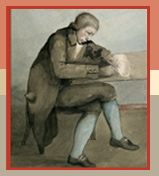Hymns and poems
Iolo Morganwg's contributions to Welsh poetry, and his religious and political radicalism were not acknowledged on anything approaching the same scale as his bardism and his counterfeit material. They were either forgotten or discarded by a nation which had no political use for them. Only a small part of Iolo's legacy as a poet was kept in the public domain. His hymns were used only by the small Unitarian Protestant denomination, whose members were concentrated in parts of Carmarthenshire and Cardiganshire. Some of his poems appeared in periodicals and on gravestones.Hymns
The fourth stanza of Iolo's hymn no. 21 from the first volume of Salmau yr Eglwys yn yr Anialwch (1812) formed the basis for the final question in a Unitarian catechism for advanced pupils:26. G. Sut mae profiad crefyddol Iolo Morganwg yn cadarnhau addysg y gwersi hyn?
Dod i mi'r fendith, fy Nuw mawr,
Fod rhan o'r byd lle'r wyf yn awr,
Yn nes at ffyrdd dy 'wyllys di,
Yn well ryw faint o'm achos i:
Os hyn a gaf o'th nefol ddawn,
Caf y byd hwn yn hyfryd iawn:
Tra threiglwyf ei ddiffaethwch ef
Caf deimlo'm enaid yn y nef.
(26. Q. How does the religious experience of Iolo Morganwg reinforce the education of these verses?
Lay on me the blessing, my grand God,
To be part of the world where I am now,
Closer to the ways of you will,
Somewhat better in my case:
If this is what I gain from your heavenly talent,
I behold that this world is lovely:
While I behold its wilderness
I shall feel my soul in the heavens.)
Poems
'Y Dyn Uniawn' (To the Righteous Man) declared that the man who lived a good life had no fear of judgement day nor the end of the world. It followed psalm no. 195 in Iolo's first volume of hymns and appeared regularly on Unitarian gravestones.Un a fo'n iawn ei fywyd – a gedwir
Yn gadarn ei wynfyd,
Ni chil, ni fyn ochelyd
Na dydd barn na diwedd byd.
Yn gadarn ei wynfyd,
Ni chil, ni fyn ochelyd
Na dydd barn na diwedd byd.



